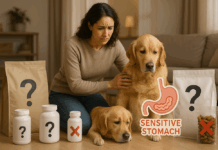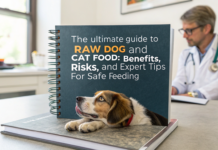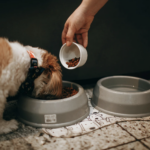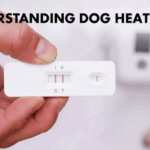Last Updated on July 29, 2024 by Dogs Vets
Can Dog Eat Yogurt?
If you think your dog can eat yogurt, then you are not alone. Many dogs can tolerate dairy products, including yogurt, but some have a lactose intolerance.
Some dogs may even vomit. If you notice any of these symptoms in your pet, then you should consult a veterinarian. Greek yogurt is also safer for your dog. However, be aware that this food may cause stomach upset, diarrhea, or bloating.
Here are the key points about whether dogs can eat yogurt:
1. Most dogs can eat yogurt in moderation, but some may be lactose intolerant and experience digestive upset like gas, bloating, diarrhea or vomiting.
2. Yogurt provides some benefits for dogs, including probiotics that support gut health, calcium for strong bones, and protein for muscles. However, the amount in a typical serving is unlikely to make a significant difference.
3. Plain, unsweetened, low-fat or non-fat yogurt is best. Avoid yogurt with artificial sweeteners like xylitol which are toxic to dogs, added sugars, chocolate, or fruit flavors.
4. Greek yogurt is a good option as it has less lactose than regular yogurt.
5. Yogurt should make up no more than 10% of a dog’s daily diet. Portion sizes vary by dog size but are typically 1-3 tablespoons.
6. Probiotic supplements designed for dogs are a more reliable way to provide gut health benefits compared to yogurt.
7. If your dog has any adverse reactions like diarrhea or vomiting after eating yogurt, discontinue feeding it and consult your veterinarian.
In summary, yogurt can be an occasional treat for most dogs, but it’s important to choose the right type and feed it in moderation. Monitor your individual dog’s tolerance and consult your vet with any concerns.
If you’re unsure whether yogurt is safe for your dog, consult your veterinarian.
Lactose in yogurt
Yogurt for dogs can be safe for your dog if you buy plain varieties with a label indicating that they are lactose-free.
You may want to buy plain, unflavored varieties as well if your dog is lactose-intolerant.
It’s also best to avoid yogurt that contains added sweeteners or other ingredients. Be careful with plant-based yogurts as some of them may contain ingredients that are harmful to your dog.
High fat content in yogurt
If your dog has a dairy allergy, high-fat yogurt should be avoided. While dairy-free yogurt may not be harmful to humans, it can pose some risks for dogs.
The first symptom is diarrhea, which indicates that your dog may have a dairy allergy. If your dog drools or licks surfaces excessively before vomiting, the yogurt could have caused its diarrhea. There are several symptoms to watch for.
Symptoms of lactose intolerance in dogs
Signs of lactose intolerance are diarrhea, vomiting, weight loss, drooling, and retching, and occur within 30 minutes to two hours of your dog eating dairy products.
While these signs don’t necessarily mean that your dog is lactose intolerant, they should be taken seriously, as they can be symptoms of other health issues.
Greek yogurt is safer for dogs
Dogs love the taste of anything we eat. They salivate in anticipation and even eat lettuce, hamburgers, and yogurt. So, why is Greek yogurt safer for dogs?
Here’s a look at the pros and cons of Greek yogurt for dogs. A dog-friendly version of yogurt contains no sugar or artificial sweeteners, so it’s a safe bet for both you and your pup. And, it can be as tasty as it sounds!
Avoid flavored yogurts
While many dog owners like to give their pets a taste of human food, flavored yogurts may not be the best choice for your dog.
Flavored yogurts are made with artificial sweeteners, such as Xylitol, which are toxic to dogs.
Vanilla yogurt isn’t the only type of flavored yogurt to avoid. Chocolate is also dangerous to dogs. While plain yogurt isn’t harmful, you should avoid chocolate-flavored varieties.
Avoid artificial sweeteners
While it is safe to feed your dog yogurt, make sure you choose a plain variety and don’t add any artificial sweeteners or sugar. Even chocolate yogurt can be harmful to your dog. Xylitol is toxic for dogs.
In small amounts, it can lead to liver failure and even death. Chocolate yogurt is a particularly bad choice. Likewise, avoid artificial sweeteners in other yogurt varieties.
Avoid fruit-based yogurts
If you are feeding your dog a yogurt-based treat, choose plain yogurt without artificial flavorings or sweeteners.
Sweeteners such as honey or fresh fruit should be used instead. Fruit-flavored yogurts are not harmful to dogs, but those containing chocolate are not recommended.
Xylitol is highly toxic to dogs. It can result in seizures and decreased blood pressure. And as for sugar, you should avoid giving your dog fruit-flavored yogurt.
Here are five commonly asked questions regarding whether dogs can eat yogurt:
1. Is yogurt safe for dogs?
Yes, yogurt is generally safe for dogs, provided it is plain, unsweetened, and free from harmful additives like xylitol. Many dogs enjoy yogurt and it can offer health benefits, such as probiotics and protein.
2. Can all dogs eat yogurt?
Not all dogs can tolerate yogurt. Many dogs are lactose intolerant, which means they may experience digestive issues like gas, bloating, or diarrhea after consuming dairy products.
3. What types of yogurt are best for dogs?
The best types of yogurt for dogs are plain, unsweetened varieties, including Greek yogurt. These options typically contain fewer sugars and additives, making them healthier choices.
4. How much yogurt can I give my dog?
Yogurt should only make up about 10% of your dog’s daily caloric intake. For portion sizes, small dogs can have about one tablespoon, medium dogs about two tablespoons, and large dogs up to three tablespoons.
5. What should I do if my dog has a negative reaction to yogurt?
If your dog shows signs of digestive upset, such as diarrhea or vomiting, after eating yogurt, you should stop feeding it to them and consult your veterinarian for further advice.
Citations:
Facts Check
We hope you enjoyed this article… What are your thoughts?
Рleаse feel free to share with us in the comments section below!

















